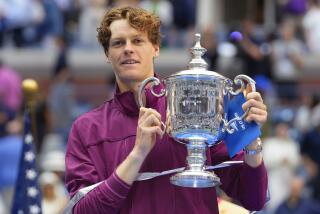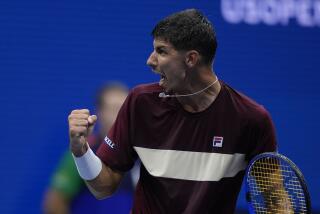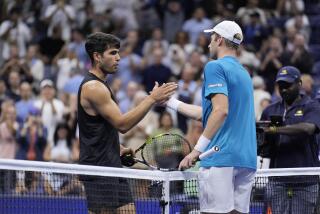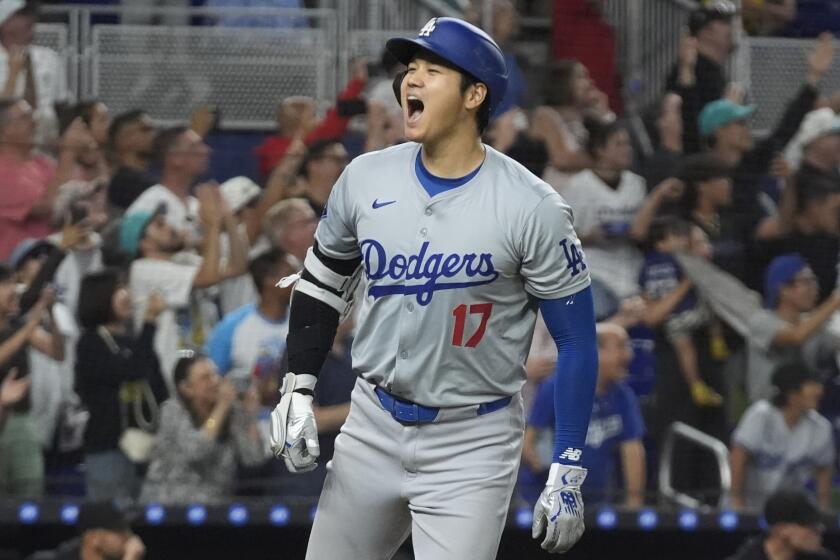Andy Murray shows true Brit grit to win Wimbledon, make history
WIMBLEDON, England — In many ways, Andy Murray’s career was encapsulated in the last game he played before he became a first-time Wimbledon singles champion and the first British man to win the title since Fred Perry’s 1936 triumph.
The 26-year-old Scot was quick and assertive in building a 40-love edge over Serbian Novak Djokovic, the 2011 Wimbledon champion. But Murray allowed Djokovic to come back and gain three break points, echoes of the fragile mental toughness that once held him back. Murray had some good shots, some good reads, and many chaotic thoughts tumbling through his mind as Djokovic, No. 1 in the world to Murray’s No. 2, produced a succession of improbable shots.
“That last game will be the toughest game I’ll play in my career, ever,” Murray said.
Surely none will provide a happier ending. The suffocating pressure of being the standard-bearer of British men’s tennis, the expectations heaped upon him — all of that vanished on his fourth championship point, when Djokovic sent a backhand into the net to seal Murray’s 6-4, 7-5, 6-4 triumph.
“I think I persevered. That’s really been it, the story of my career, probably,” said Murray, who lost last year’s final to Roger Federer but went on to defeat Federer for the Olympic gold medal four weeks later, also at Wimbledon, then earned his first Grand Slam title at the U.S. Open.
As the impact of his achievement sunk in, Murray pumped his fists and then knelt on the sun-baked grass of Center Court, cradling his head in his hands. He climbed up to the guests’ box to hug friends and family and turned to descend to the court to get his trophy before he remembered to thank his mother, Judy, with a big embrace.
He also drew a smile from his stern-faced coach, Ivan Lendl, an eight-time Grand Slam champion who never prevailed at Wimbledon. Lendl, whom Murray praised for his honesty and ability to help Murray learn from his losses, made this perhaps the least surprising result in a fortnight filled with eye-opening results.
“Ideally he would have won it himself but I think this was the next-best thing for him. I’m saying it seriously,” Murray said. “I think he believed in me when a lot of people didn’t. He stuck by me through some tough losses the last couple of years. He’s been very patient with me. I’m just happy I managed to do it for him.”
Djokovic, whose 11-7 career edge over Murray entering Sunday included wins in their last three meetings since Murray beat him at the U.S. Open, wasn’t as impressive Sunday as he was in striding through the quarterfinals without losing a set.
Depleted by his 4-hour 43-minute semifinal victory over Juan Martin del Potro on Friday, Djokovic wasn’t helped by getting into long rallies in the first set Sunday.
The first six or seven games featured long rallies; Murray had three break points in the first game that Djokovic saved, but Murray had four more break points in the third game and broke Djokovic’s serve for a 2-1 lead. Murray broke the Serb again for a 4-3 lead before closing out the 59-minute set.
“It took a lot out of me,” Djokovic said. “I cannot look for excuses in the match two days ago. . . . Because I didn’t feel maybe I had enough gas in the important moments I went for my shots more than usual.”
Djokovic, using a lot of drop shots and volleys, broke Murray’s serve in the fourth game of the second set to take a 3-1 lead and held for 4-1, appearing on the verge of taking control. But Murray won the next three games and broke Djokovic’s serve for a 6-5 lead before winning the 69-minute set with an ace.
“He was getting some incredible shots on the stretch and running down the drop shots. He was all over the court,” said Djokovic, who committed an uncharacteristic 40 unforced errors in the match. “He played fantastic tennis, no question about it. He deserved to win.”
Murray proved that in the third set, after sprinting to leads of 2-0 and 4-2 and holding off Djokovic in that final game. BBC interviewer Sue Barker said it had been torturous to watch. “Imagine playing it,” Murray said, with perfect comic timing.
“I said that winning Wimbledon, I think, is the pinnacle of tennis,” he said. “I think the last game almost increased that feeling.”
After another round of interviews, Murray was off to the champions’ dinner and to sort out what had happened. And to realize he need not hear about Perry and that long wait anymore.
“The last four or five years, it’s been very, very tough, very stressful, a lot of pressure,” he said. “The few days before the tournament were really difficult as well. . . . I think now it will become easier. I hope it will. I hope it will.”
Twitter.com/helenenothelen
More to Read
Go beyond the scoreboard
Get the latest on L.A.'s teams in the daily Sports Report newsletter.
You may occasionally receive promotional content from the Los Angeles Times.











